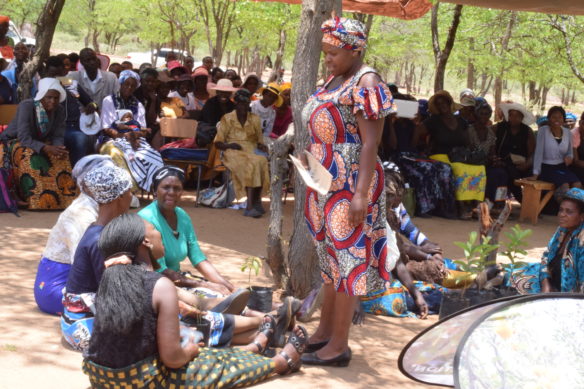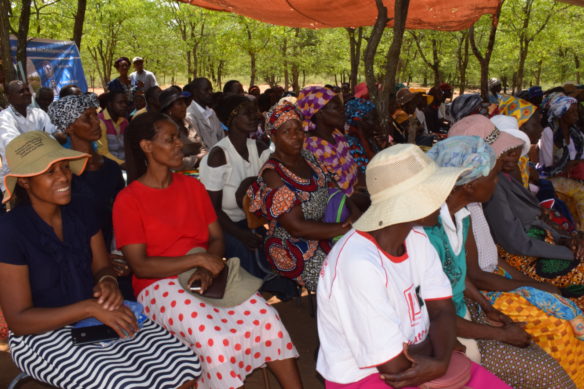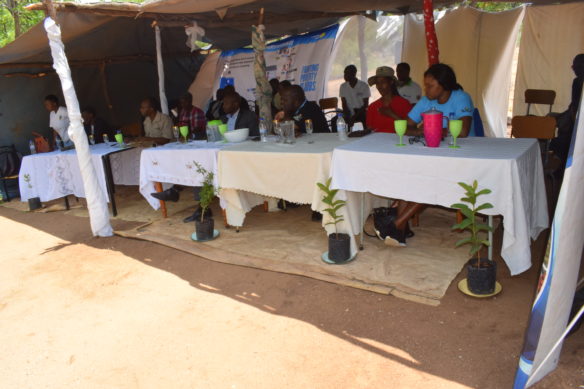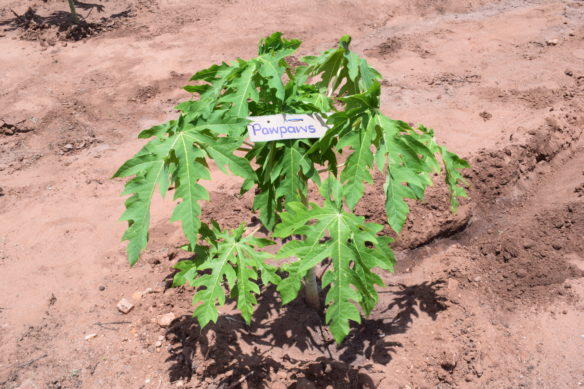SAMIKANG Sebata (56), a villager under Chief Nhlamba in Matabeleland South, has finally tasted economic freedom. For many years, the mother of three has been living in abject poverty in her home area in Gwanda district, which has continuously suffered poor harvests due to drought. Last season, was no different owing to the El Nino-induced drought.
Sebata planted several agricultural crops like maize for sustenance but the drought that is blamed on climate change saw her crops wilt before they matured, leaving her family food insecure.

Gwanda falls within the dry regions of the country, receiving very little rainfall each year, which makes it to susceptible to agricultural crop failures.
But following the introduction of the Green Enterprise Project in her area by a non-profit organisation, Hand in Hand Zimbabwe (HHZ), Sebata is a relieved person.
The Green Enterprises project is one of the economically and environmentally viable projects adopted by HHZ, being implemented in Gwanda district first as a pilot project.
Running from September 2018 to August 2021, the project seeks to achieve improved sustainable economic activities and strengthened resilience to climate change for the resource constrained, particularly women and youth.

In Gwanda, HHZ helped 45 villagers, including women and youth, to set up an enterprise known as the Progressive Garden in ward 14 where fruit trees and various vegetables are grown for sustenance and commercial purposes.
The project, sitting on 0,8 hectares of land, uses a solar-powered borehole.
“When Hand in Hand introduced this project to us, we did not understand their vision but now we do.
“We have realised that this project will bring about massive development into this community.

“With this project, our future is bright,” Sebata, who is the Progressive Garden chairperson, said.
“It will help empower our children, and families as well as our community.
“As time goes on, this project will be sustaining our lives. It will be our bank of some sort.
“The project will also help us to assist our husbands back home in terms of bringing in income for family upkeep.
“Some of us have become breadwinners through this project.”
Apart from selling fruits from these trees, women also sell tree seedlings for $15 each.
So far, they have sold more than 100 tree seedlings and have 1 083 that are ready for the market.
About 63 types of fruit trees that include mango, guava, lemons and pawpaw have been planted in the garden.
The market for their produce is in Gwanda town and surrounding communities.
HHZ area manager Unami Dube told Sunday Southern Eye, during national tree planting day commemorations held in Gwanda recently that the project will benefit 80% women and 20% men. Of the total figure, at least 30% should be youth.
Dube said taking on board women and youths in economic activities will enhance their participation in decision making at household and community level.
She said this will help to reduce their vulnerability to all forms of abuse.
“The reason why we started this project is that we wanted to mitigate against climate change effects,” Dube said.
“So that’s why we came up with a project that is in line with climate resilience.
“We, therefore, decided to do gardens where these villagers will grow vegetables and fruit trees, among others.”
The project is expected to help establish at least 300 individual projects and 30 group enterprises around the country that are adaptive to climate change shocks, increase the income generation of the entrepreneur and also to have individuals employed in a green enterprise as holders of green jobs.
Progressive Garden member Mandile Dube said the project will help sustain their families.
“We are grateful to Hand in Hand Zimbabwe.
“We are now empowered,” she said, adding that for vegetables, they have cultivated tomatoes, butternut, rape and leaf vegetable chomolia.
Village head Mbazo Dube described the project as a life saver.
“It will give us life. I would like to encourage these women to work hard. This is a noble project that is needed in the community,” Mbazo said.
There are about 170 homesteads in the area where the project is located.
“This project will grow and as a community we are very grateful,” another villager, Christopher Magwala, said.
Agritex official Gloria Bulala commended HHZ for coming up with the project, saying it will contribute a lot towards food security.
Gwanda deputy district development coordinator Judge Dube said the project will assist Zimbabwe to achieve Sustainable Development Goals (SDGs) number 2 and 15.
SDG 2 seeks to end hunger, achieve food security and improved nutrition and promote sustainable agriculture while SDG 15 seeks to protect, restore and promote sustainable use of terrestrial ecosystems, sustainably manage forests, combat desertification, halt and reverse land degradation and biodiversity loss.
“As you may be aware, Gwanda falls within the dry regions of the country, receiving very little rainfall each year,” Judge said.
“This makes the district susceptible to agricultural crop failures, and, therefore, growing fruit trees becomes a strategic fallback position hedging farmers against hunger.
“Trees are naturally more resilient in harsh weather conditions than agricultural crops.”
“Food and nutrition security remains one of the critical focal areas, and is a key deliverable that will ensure the attainment of the upper middle income economy status by 2030.”
He said trees and forests played a fundamental role in environmental management and mitigate the effects of climate change, Judge said their preservation is critical for a sustainable environment.
Article 5 of the Paris agreement recognises the role that trees and forests play in mitigating climate change effects by converting carbon dioxide into oxygen.

“Trees also provide additional income and dietary diversity enabling our communities to cope with shocks from climatic change effects such as droughts,” Judge added.
“Fruit tress offer a multiplicity of nutrients to our communities, reducing occurrences of diseases that are related to poor diets like blindness.”
He said climate change and climate variability had made agriculture activities unsustainable and that non-timber forest products could be used to supplement agriculture.
Zimbabwe has not been spared from the devastating effects of climate change which have a negative bearing on food security.
More than seven million people in Zimbabwe — about a third of the population — need food aid, with many coming close to starving, according to the United Nations.
To mitigate against climate change effects, Forestry Commission provincial manager Bekezela Tshuma said villagers should stop deforestation.
He said the deforestation rate in the country stood at 300 000 ha per year while in Matabeleland South province alone it was pegged at 5000 ha.
The province is targeting to plant more than 20 000 trees in all districts.
HHZ programmes director Emmanuel Makiwa said they were hoping to implement the project successfully so that they can get more funds before cascading it to other districts.
“It’s still a pilot project; once the donors are happy with what we are doing they will provide more funds to cascade it,” he said.
“The project here is targeting about 300 people. Our objective actually is to provide a dripping system but for now we don’t have the money for drip system, that’s why we are putting taps.
“We are going to add some more watering taps. Then if we get more funds we put an irrigation system.”
HHZ is a non-profit organisation whose main aim is to help poor and marginalised people create better livelihoods for themselves and their families in rural Zimbabwe.
This is done through a help to self-help approach, mainly aimed at women and youth.
Through its interventions, the organisation has made great strides in the fight against poverty in Lupane, Nkayi, Bulilima, Gwanda, Shurugwi, Chikomba and Chirumhanzu.
“With such projects, we are saying good-bye to poverty and malnutrition. We are now economically empowered,” Sebata said.

